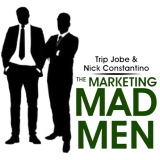LEADERSHIP INSIGHTS, PURPOSE, AND THE POWER OF TENACITY – Episode 177 of The Marketing MadMen
Description: In this fast-paced episode of The Marketing Madmen, hosts Trip Job and Nick Constantino sit down with Andy Christiansen—motivational speaker, TED Talk presenter, and host of The Tenacious Podcast. They delve into actionable insights on emotional intelligence, leadership, business scaling, workplace culture, and overcoming adversity. Andy shares his journey from growing up in a blue-collar Cleveland neighborhood to becoming a sought-after speaker and adjunct professor of leadership for the U.S. Air Force. Learn how to inspire purpose-driven teams, embrace vulnerability as a strength, and tackle the challenges of personal growth in today’s ever-changing world. This episode is packed with valuable takeaways for entrepreneurs, leaders, and anyone seeking to level up their life and career.
Key Takeaways:
- How emotional intelligence (EQ) and vulnerability enhance trust and leadership in business.
- Strategies to scale businesses beyond the critical $1M–$10M and $10M–$25M thresholds.
- Building a workplace culture that values purpose, accountability, and adaptability.
- Personal insights on overcoming adversity, from mountain climbing to breaking barriers in business.
- A practical exercise to discover your life purpose in under a minute.
- Why continuous learning and embracing change are crucial to long-term success.
Keywords: Leadership, Emotional Intelligence, Scaling a Business, Workplace Culture, Motivation, Purpose, Personal Development, Andy Christiansen, Marketing Madmen Podcast, Entrepreneurship, Vulnerability, Adversity, Resilience.
Hashtags: #Leadership #EmotionalIntelligence #ScalingBusiness #PurposeDriven #Motivation #PersonalDevelopment #MarketingPodcast #Entrepreneurship #WorkplaceCulture #AndyChristensen
160-Character Meta Description: Discover leadership insights, emotional intelligence tips, and business scaling strategies with Andy Christiansen on The Marketing Madmen. A must-listen episode!
Focus Keyword: Leadership Insights
Click here to be a guest on a future episode
Click here for previous episodes
Episode 177 of The Marketing Madmen opens with high-energy introductions by Trip Job and Nick Constantino, live from the Battery. They’re prepared to “hit the ground running” with their guest, Andy Christiansen—a motivational speaker, TED Talk presenter, and host of the Tenacious Podcast. Andy is praised for his adventurous life, which includes mountain climbing, flying in fighter jets, and helping others through his leadership and motivational work.
Andy shares his journey, growing up with a blue-collar background in Cleveland, Ohio, raised by a single dad. His entrepreneurial spirit emerged at a young age as he started various small businesses to make ends meet. Despite early hardships, he remained determined, earning a college degree, writing a book, and becoming an adjunct professor of leadership for the U.S. Air Force.
The conversation highlights Andy’s authenticity and tenacity, which resonate with audiences. He explains how his experiences have shaped his perspective on leadership, scaling businesses, and personal growth. The hosts dive into topics like navigating senioritis in business, adapting to change, and the critical challenges of scaling businesses from $1 million to $25 million in revenue. Andy emphasizes the importance of evolving strategies and avoiding stagnation, citing inspirational examples and lessons from his own career.
The episode is dynamic and packed with insights into personal resilience, leadership, and scaling businesses, offering valuable takeaways for entrepreneurs and leaders seeking growth and motivation.
In the next segment of The Marketing Madmen, Trip Job and Nick Constantino delve into critical themes of self-awareness, emotional intelligence (EQ), and the challenges of scaling a business. They explore how success can sometimes erode self-awareness, as individuals begin to believe their own hype, making it harder to take a step back and objectively assess their strengths, weaknesses, and growth areas.
The conversation centers on the need for humility in leadership, emphasizing that the most successful business owners delegate effectively. Andy Christiansen highlights the importance of “coaching people up” rather than simply hiring and assigning tasks. He argues that today’s business environment requires leaders to train and empower others, fostering leadership skills within their teams to scale sustainably.
Using a vivid analogy, Andy compares running a business to raising children—adjusting approaches as they grow and evolve. He stresses the need for business owners to evolve their own leadership styles as the organization matures. This adaptability, combined with emotional intelligence, allows leaders to overcome the ego-driven tendency to remain the sole decision-maker and instead invite external perspectives and expertise.
The trio also discusses the delicate balance between confidence and ego, particularly when transitioning from small-scale operations (0-$10 million) to more complex business structures ($10-$30 million). They acknowledge the difficulty many founders face in sharing control or admitting the need for help, which often stalls growth.
As the hosts segue into emotional intelligence, Andy shares a personal anecdote about how he developed EQ through a year-long journey of self-discovery in therapy. He defines emotional intelligence as “heart skills versus head skills” and highlights its role in modern leadership—encouraging business leaders to combine awareness and action to achieve meaningful progress.
The segment closes with reflections on the importance of learning from history and understanding broader perspectives. Nick mentions books like Ray Dalio’s and Fareed Zakaria’s works, and even a historical exploration of the salt trade, as examples of how looking backward can provide critical insights into the present and future. This sets up a broader discussion of how emotional intelligence and historical context can shape effective leadership. Let me know if you’d like more refinements.
In this segment of The Marketing Madmen, the hosts and Andy Christiansen transition into a deeper discussion on vulnerability, emotional intelligence (EQ), and building a culture that thrives on accountability and trust. They explore how vulnerability, once seen as a weakness, is now celebrated as a superpower in leadership. Citing Brené Brown’s influential work, they highlight how showing authenticity and relatability strengthens trust in relationships, both personal and professional.
Andy draws on psychological research, noting that vulnerability from those we admire—attractive, successful, or otherwise aspirational—can enhance relatability and trust. This idea, however, comes with the challenge of balancing genuine vulnerability with the risk of exploitation, as some may misuse these principles for personal gain.
The conversation shifts to the need for clarity and confrontation in leadership. Andy reveals that 92% of individuals are naturally conflict-averse, a statistic from a judgment assessment tool he uses to analyze workplace dynamics. This aversion to conflict often results in communication breakdowns and stagnation, making it vital for leaders to create environments where accountability is clearly defined and embraced.
Accountability, as Andy explains, stems from access and information—leaders must provide clear metrics and involve their teams in setting expectations collaboratively. This approach encourages ownership and avoids the pitfalls of micromanagement. Trusting others to hold themselves accountable fosters a culture of transparency and mutual respect, paving the way for sustainable growth.
As the hosts dive into EQ training, they explore whether emotional intelligence is innate or learned. Andy emphasizes that while some individuals may naturally possess EQ, it is primarily a learned skill, shaped by personal experiences, relationships, and self-awareness. Using anecdotes, Andy illustrates how emotional intelligence, once honed, can be a transformative force in leadership and culture-building.
The segment concludes with a broader conversation about workplace culture, addressing the misconceptions of “perks” like free snacks or casual environments as the foundation of strong culture. Andy underscores that real culture is built on shared values, consistent actions, and intentional leadership—elements that define the day-to-day experience of employees. This sets the stage for the next discussion on aligning culture with long-term business success. Let me know if you’d like me to continue summarizing.
In this segment, the discussion dives into workplace culture, self-actualization, and personal achievements that inspire and teach valuable life lessons. The hosts and Andy explore how modern workplace expectations, particularly among millennials and Gen Z, have shifted beyond basic needs like food and shelter to a desire for purpose, impact, and personal growth. Andy defines self-actualization as reaching one’s potential and living out one’s purpose—a concept now highly relevant in professional settings.
Andy points out that millennials and Gen Z employees often seek guidance in discovering their purpose, an expectation that can be both a challenge and an opportunity for leaders. Companies that foster a sense of purpose from the top down can inspire loyalty and drive, but leaders must balance this with encouraging individuals to take ownership of their self-discovery journey.
The conversation also touches on the complexities of managing diverse generations in the workplace, emphasizing the importance of understanding different perspectives shaped by upbringing and socio-economic status. Andy highlights the “curse of knowledge,” where experienced leaders may struggle to understand why others don’t see things the way they do—a common barrier to effective leadership and mentorship.
Shifting gears, Andy introduces his upcoming book, Minute to Meaning, which provides a straightforward method to help individuals discover their life purpose in under a minute. This aligns with the recurring theme of helping people find clarity and meaning, whether in their professional roles or personal lives.
The hosts then explore Andy’s passion for endurance activities like running marathons and climbing mountains. Andy shares how these pursuits not only keep him physically and mentally grounded but also serve as powerful metaphors for overcoming challenges and fostering resilience. He recounts taking his 14-year-old son on a treacherous 14,000-foot hike in Colorado—a pivotal bonding experience that sparked his love for mountain climbing. Andy now leads group hikes, including experiences with individuals overcoming addiction, emphasizing the transformative power of setting and achieving goals.
The segment concludes with reflections on the psychological impact of accomplishments. Andy explains how each step toward a goal releases dopamine, while reaching the summit brings a flood of serotonin—a potent mix that underscores the importance of perseverance and pushing beyond perceived limits. This sets the tone for the next discussion on education, personal development, and redefining success.
The final segment of The Marketing Madmen wraps up with a thought-provoking discussion on education, workforce readiness, and the evolving expectations of leadership. The hosts and Andy Christiansen explore the challenges of preparing the next generation for a rapidly changing world, emphasizing the need for adaptability, purpose-driven work, and practical skills.
Andy highlights the importance of instilling resilience and a willingness to face adversity in children, noting that modern comforts often shield young people from the hard lessons that build character. However, the hosts acknowledge the systemic barriers that limit upward mobility, questioning how to reignite the American Dream in a society where socio-economic status heavily influences opportunities.
The conversation shifts to the value of alternative education paths, such as certifications and trade schools, which can provide practical skills and immediate workforce readiness. Andy shares insights from a corporate leader at Coca-Cola who prioritizes certifications over traditional degrees, reflecting a growing trend among forward-thinking employers.
To inspire self-reflection and purpose, Andy introduces a key question from his upcoming book, Minute to Meaning: “If you had $10 million in the bank, what would you do for work?” This question encourages individuals to identify their passions and unique abilities, fostering a sense of purpose that aligns with their professional and personal goals.
The episode concludes with a call to action for leaders to break away from outdated practices and embrace a culture of self-actualization and innovation. Andy challenges millennials, who have often criticized traditional corporate structures, to lead the charge in creating workplaces that prioritize purpose and values.
As the show ends, the hosts reflect on the dynamic and unscripted nature of the conversation, emphasizing the importance of practical application and continuous learning. Andy’s book, Minute to Meaning





